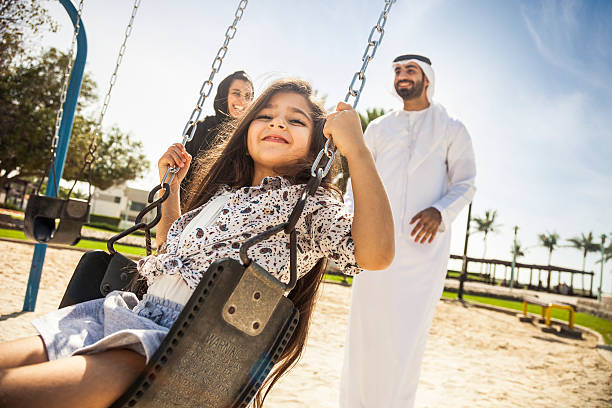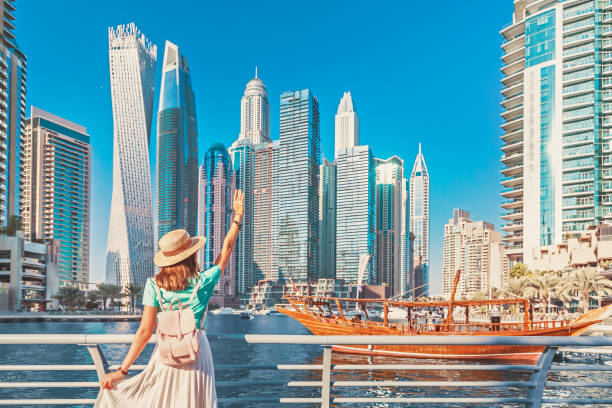Living in UAE is like no other place. Many different types of people live here, and the fun at night is as good as in London and New York. Plus, there’s no income tax here, so you can find great opportunities and special things that make it an amazing place to live.
Living in UAE
Interested in Living in UAE?
The UAE provides expatriates with a wonderful quality of life. You can find modern housing, top-notch medical services, excellent international schools, and a well-developed infrastructure. In the vibrant cities of Dubai and Abu Dhabi, there’s a lot to enjoy, including beautiful beaches, exciting water sports, indoor skiing, fantastic dining options, and huge shopping malls.
However, it’s important to note that this quality of life comes with a cost. The cost of living in the UAE has gone up in recent years, and although expat salaries are still relatively high, the benefits packages are not as extensive as they once were.
Housing in the UAE
Rent prices in the UAE have steadied in recent years, but finding a place to live is still likely to be your most significant expense. While many companies used to offer housing for expat employees, formal housing allowances have become less common.
To rent a place in the UAE, you’ll need a residence visa. When you sign a lease, you’ll typically be required to provide your visa and passport, proof of your address, and proof of income from your employer.
The quality of housing in the UAE is generally high, and you’ll have numerous options to consider. Apartments often come with shared amenities like a gym, sauna, and swimming pool. Compound villas may include facilities such as a medical center, tennis court, gym, and a restaurant.
You can choose between furnished and unfurnished housing. Keep in mind that many unfurnished apartments may not include basic appliances, so be prepared for initial setup costs if you opt for this type of accommodation. Due to the transient nature of the UAE, there’s a thriving second-hand market where expats sell their furniture and appliances before returning home. You can find these listings through word of mouth or on various classified websites.
Typically, leases in the UAE are for a year, and it’s common to pay a full 12 months’ rent upfront, though some landlords might accept post-dated cheques. Additionally, you’ll likely need to provide a security deposit, usually around 5% of the annual rent. Before signing the lease, make sure to check for any extra charges, such as maintenance fees, and ensure that the landlord’s responsibilities are clearly outlined in the agreement.
Culture of the UAE
Adapting to the culture in the UAE, despite its cosmopolitan nature, can be a significant adjustment. Dressing conservatively is essential. While many local women wear traditional garments like the hijab or abaya, expatriates are not required to do so. However, it’s still crucial to dress modestly, covering your shoulders and legs when in public.
In the past, unmarried couples were not allowed to live together, and an alcohol license was necessary for purchasing alcohol. However, recent government changes have expanded personal freedoms for both expats and locals. Now, you can buy alcohol without a license, and cohabitation of unmarried couples is permitted.
During Ramadan, the holiest period in the Islamic calendar, it’s important to refrain from eating, drinking, and smoking in public or in front of Muslim friends and colleagues during daylight hours. At the end of the daily fast, expatriates are welcomed to participate in the evening feast. Many companies operate on reduced hours during this time and provide special rooms where non-Muslim employees can eat during the holy month.
Adjusting to the persistent heat is a significant challenge for expats in the UAE. Fortunately, all buildings are air-conditioned to alleviate the discomfort, but it may take some time to get used to the predominantly indoor lifestyle.
It’s worth noting that the workweek in the UAE typically starts on Sunday, with the weekend falling on Friday and Saturday. The majority of government and public offices remain closed on Saturdays.
Educational System in the UAE
Expat children have the option to enroll in public schools in the UAE, but unlike local students, expats are required to pay school fees. Furthermore, since instruction in public schools is primarily conducted in Arabic, many expat parents prefer to explore international schools for their children’s education.
The academic year typically spans from September to July and is divided into three terms. School days run from Sunday to Thursday, although the specific school hours can vary depending on the institution.
Private schools:
Private education in the UAE can be costly. It’s no longer common for expat employment packages to include an education allowance. You’ll need to plan your budget to cover school fees, as well as additional expenses like uniforms, textbooks, transportation, and extracurricular activities.
Homeschooling:
Given the high cost of international education in the UAE, many expat parents are turning to homeschooling. This option is also suitable for those who know they won’t be in the country for an extended period, as it avoids the bureaucratic process of enrolling in an international school. Home schooling is gaining popularity, and there are support groups available to assist parents in this endeavor.
International schools:
Most international schools in the UAE follow either the British or American curriculum or offer the International Baccalaureate program. Additionally, you can find schools following the French, German, Japanese, and Indian curricula. According to local regulations, all students in public and private schools are required to study UAE Social Studies and Arabic as a second language. These subjects are compulsory only until Grade 9. Schools are also obliged to offer Islamic Education as a subject, although it’s optional for non-Muslim students.
Staying Connected in the UAE
When it comes to mobile phones, most international networks have roaming agreements in the UAE. However, maintaining your home mobile contract can be costly. Once you have a residence visa and a bank account, you can apply for a local contract. Pay-as-you-go services are a quicker option to set up when you first arrive.
Choosing a telecoms provider is fairly straightforward. There are two main companies, Du and Etisalat, which dominate the market. Most residential buildings come pre-connected with services from one of these providers. Both companies offer bundles for internet, cable, and phone services, so it’s a good idea to explore your options.
In the UAE, you can usually access most social media websites, such as Facebook, LinkedIn, and Twitter. Instant messaging services like WhatsApp are widely used but may have some restrictions. Notably, Skype is not allowed in the UAE. Additionally, some websites are blocked due to content that may be considered offensive to local religious and moral values.
Healthcare System in the UAE
To obtain a residence visa in the UAE, expatriates must undergo a health assessment. The UAE boasts a robust healthcare infrastructure with modern medical facilities. Both public and private healthcare services are accessible, but many expats prefer private hospitals where medical staff commonly speak English. Numerous doctors in the UAE are expatriates themselves or have received training abroad.
It’s important to note that private healthcare in the UAE can be expensive, so having comprehensive medical insurance is essential. In Abu Dhabi, medical insurance is a requirement for obtaining a residence visa. By law, companies in Abu Dhabi and Dubai are obligated to provide medical insurance for their expat employees, so this is an expense that is typically covered.
Pharmacies are widespread in all cities and often operate around the clock. While a wide range of medications is available, the UAE enforces stringent drug laws, which may require a prescription for items that are available over the counter in other countries.
Emergency services in the UAE are generally adequate, although ambulances are primarily deployed for road accidents. In many cases, individuals rely on their private vehicles or taxis to reach a hospital during an emergency.
Transportation in the UAE
The UAE’s public transport system is not extensive, so owning a car is the most convenient way to travel. It’s worth noting that gasoline is affordably priced, and you might find that you can afford a more luxurious vehicle compared to what you could have back in your home country. The roads are generally in good condition, and the cities are connected by multi-lane freeways. However, traffic congestion is a common issue. Traffic rules are strictly enforced, and the UAE has a zero-tolerance policy for drinking and driving. You can drive with an international driver’s license, but if you have residency status, you’ll need a local one.
Due to the sweltering heat, walking and cycling aren’t popular modes of transportation in the UAE. In major cities, you can opt for buses or taxis. Ride-hailing services like Uber are also readily available, and Dubai features an efficient and affordable metro system.
The UAE is a significant air travel hub, with Dubai boasting one of the world’s busiest airports. Many international airlines offer daily services to and from the Emirates, making it an ideal base for expats who wish to explore other destinations.
Cost of living in UAE
The cost of living is notably high in the UAE. Cities like Dubai and Abu Dhabi rank among the most expensive in the Gulf region. Despite the advantageous tax environment, living expenses can accumulate as expats indulge in luxuries they might not typically spend on in their home countries.
Two major expenses to budget for are accommodation and schooling. Rent can consume a significant portion of your income, sometimes almost half. Expatriate parents often face substantial fees for international schools, as their children are less likely to attend public schools.
While groceries and everyday household items are reasonably priced, clothing and imported goods can be costly. Organic food and Western brands also come with premium price tags. To manage costs, consider trying Emirati alternatives. Dining out is a common luxury for many expats, and you’ll find that Indian, Arabic, Chinese, and African restaurants are generally more budget-friendly than hotel eateries and bars. Alcohol, on the other hand, can be expensive, but some hotel bars and restaurants offer happy hours with discounted drinks.
Working in the UAE
If you’re relocating to the Gulf nation for employment, your destination is likely to be either Abu Dhabi or Dubai, as these cities host the majority of job opportunities. It’s worth noting that a significant portion of these positions are occupied by men, who make up the majority of both the population and the workforce. In 2021, the Emirati government reported that 91% of men above the age of 15 were employed, compared to only 52% of women.
While the UAE’s economy is heavily dependent on oil, government agencies, and construction, the tourism industry is thriving, particularly in Dubai. In 2023, Dubai ranked as the world’s sixth-most popular tourism destination, according to studies by Mastercard and Euromonitor International.
Expats in Abu Dhabi or Dubai typically come to the UAE for roles in accounting, finance, or IT. Unless you are employed by a multinational corporation like Microsoft, AstraZeneca, DHL, FedEx, Marriott, or Hilton Worldwide, which have established offices in the country.
Working in the UAE offers several advantages. In addition to the tax-free income, many companies provide benefits such as a housing allowance, contributions towards your children’s school fees, medical insurance, and even free airfare back to your home country.
However, it’s important to be aware that labor laws in the UAE differ from those in many other countries. Joining a trade union or participating in a strike is considered a criminal offense and can lead to deportation.
Living in UAE with a Family
Once you’ve successfully arranged for your spouse and children to join you in your new life, the next step is to ensure a smooth transition for them. The UAE is advantageous in this regard, as English is widely spoken, which can simplify the process.
Family holds significant importance in the UAE, similar to many cultures, and it provides a natural way for you to connect with locals and colleagues. Regarding your children’s education, you’ll find an array of private and international schools to choose from. If you’re concerned about potential culture shock or adapting to a new curriculum, there’s no need to worry.
In the 2022/2023 school year, Dubai boasts 88 international schools, with nearly half offering a British curriculum. Additionally, there are 29 schools aligned with American education standards and 35 that provide the International Baccalaureate program.
Your family will have the opportunity to immerse themselves in Emirati culture, including experiencing the call to prayer five times a day. Yet, they can still enjoy Western traditions. Easter and Christmas are celebrated with pride in the UAE, complete with Christmas trees and mall Santas.

Entertainment for Families in the UAE
In the UAE, there’s an abundance of family-friendly activities to enjoy, including top-tier sports. Abu Dhabi’s Yas Marina Circuit hosts an annual Formula One race, and football and cricket are exceptionally popular. Don’t miss the opportunity to take your children to witness camel races in Abu Dhabi or Al Ain, especially since these races often feature robot jockeys.
For a unique outdoor experience, you can go camping in the picturesque natural settings of Fujairah beach or Liwa in the Empty Quarter, known for its vast sand dunes reminiscent of those seen in Star Wars films. Speaking of movies, you can catch all the latest releases, ensuring you won’t miss out on the newest Marvel blockbusters. While some films have been banned in the UAE in recent years, such as Black Swan, Love and Other Drugs, and Fifty Shades of Grey, this is rare and generally doesn’t apply to movies suitable for children.
Temperature in the UAE
Summer temperatures can climb to around 45°C, while winter can bring relief with more manageable temperatures, dropping to around 10°C depending on your location. In Dubai, the temperature seldom falls below 15°C throughout the year, and it can soar to a scorching 49°C in the summer. While this heat can pose challenges during the summer months, the good news is that nearly everywhere you go, including bus stops, is air-conditioned.
The perpetual warmth also means that you and your family can enjoy the numerous Emirati beaches year-round. Yes, whenever the mood strikes, you can head to the beach to work on your tan, build sandcastles, or even try out various water sports. Make sure to bring your sunscreen along.
Is the UAE a safe place to live?
The UAE is generally considered a safe place to live. It has a low crime rate, including low levels of violent crime. The government and law enforcement agencies in the UAE take security and safety seriously, making efforts to maintain a safe environment for both residents and visitors. However, as with any country, it’s essential to exercise standard safety precautions and stay informed about local guidelines and regulations to ensure your well-being.

